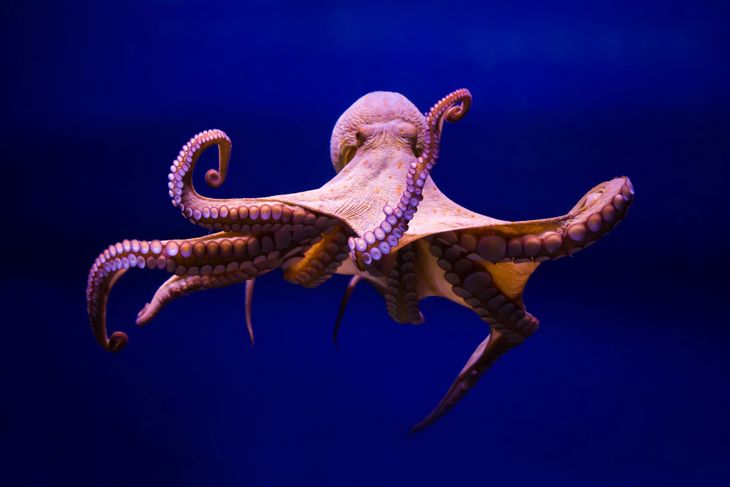
Today (8th October), on World Octopus Day, we have released a new report revealing eight reasons why octopus factory farming is cruel, damaging to the planet, and must be stopped.
Eight reasons why
Our report, 'Octopus Factory Farming: A Recipe for Disaster', shows how plans to expand octopus factory farming would cause them to suffer greatly due to their solitary and inquisitive nature, and exposes the lack of any approved humane slaughter method. There is also no legislation to protect their welfare in farms and their carnivorous diet makes farming them unsustainable and damaging to the environment.
The word ‘octopus’ comes from the Greek ‘októpus’ meaning ‘eight foot’, so our report reveals eight reasons why octopuses should not be factory farmed.
High consumption
Wild-caught octopuses are consumed all over the world, especially in several Mediterranean countries across Europe, as well as in Asia and Mexico. Approximately 1,300 tonnes of octopus are consumed in the UK each year, and that amount has increased 12-fold since 1990. This figure does not account for the amount of octopus eaten by British tourists while abroad.
In the EU, Italy consumes the most octopus, at over 60,000 tonnes per year, but there has recently been high demand for octopus in other countries, such as the United States and Japan, even as wild octopus populations shrink.
Lives not worth living
Dr Elena Lara, our Fish Research Manager and author of the report, says: “The Netflix film, My Octopus Teacher, gave the world a moving glimpse into the lives of these unique, naturally solitary and fragile wild animals. People who watched it will be appalled to discover that there are plans to confine these fascinating, inquisitive, and sentient creatures in factory farms. Their lives would simply not be worth living.
“That’s why, today, we have sent our report and written letters to the governments in Spain, Japan, Mexico and the US, where octopus farming is being developed, urging them to prevent any further development of this cruel and environmentally damaging practice.”
Unfortunately, industries are looking into the potential to intensively farm octopuses without proper consideration of their wellbeing or the environmental damage it would cause. That’s why we will continue to pressure policymakers and other relevant stakeholders to prevent the farming of these remarkable creatures.
Download and read the report here.
